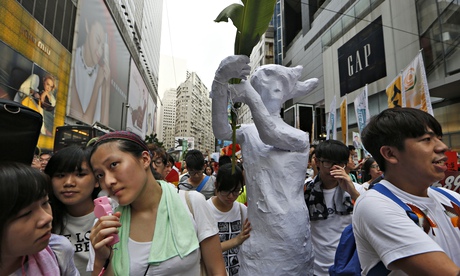China: a great power we can't trust
As pro-democracy protesters in Hong Kong gain strength, Beijing must honour its commitment to their liberty

Protesters carry a replica of the goddess of democracy as they march for greater democracy from China during an annual protest in Hong Kong on 1 July 2014. Photograph: Kin Cheung/AP
Pieces of paper have a poor reputation among political realists, and history is littered with the torn-up fragments of solemn treaties. Seventeen years after a tearful Chris Patten, the last colonial governor of Hong Kong, sailed away on the royal yacht Britannia in July 1997, two pieces of paper are in contention, and they're sparking an increasingly bitter confrontation over the right of Hong Kong's people to choose their own government.
More than 700,000 people voted for that right last week in an unofficial referendum organised by Occupy Central, a pro-democracy movement founded in 2013. And on 1 July tens of thousands took to the streets in Hong Kong's largest pro-democracy rally in more than a decade. The referendum was denounced as an "illegal farce" by mainland newspaper Global Times; ballot boxes and papers intended for use in the referendum were seized; the online poll came under repeated cyber attack; and every mention of the referendum, and of Occupy Central, has been scrubbed from the Chinese internet.
Occupy, though, is determined to secure a voting system that meets international standards, and says it will bring traffic to a standstill in the central business district if asking nicely does not work. It is supported in its aims, if not always in its tactics, by a broad range of democratic interests in Hong Kong, many of whom point out that they are asking for no more than what the Chinese government has promised but failed to deliver.
At the heart of the confrontation is the joint declaration, the 1985 agreement between the UK and China, and a white paper published by the Chinese government last month. China and Britain registered the declaration at the United Nations as a legally binding treaty. Along with the mutually agreed basic law, which came into effect in 1997, it pledged to guarantee Hong Kong's continuing liberties, rights and way of life for 50 years, during which time Hong Kong would run its own affairs under Deng Xiaoping's formula of "one country, two systems".
As a British colony, Hong Kong never enjoyed universal suffrage, but this was subsequently promised in elections for both the chief executive and the legislature – half of whose members are elected by elite special interest groups that include bankers and lawyers. Beijing has repeatedly delayed the introduction of a fully democratic system and, critics say, steadily expanded its influence in Hong Kong's affairs. This creeping control has provoked increasingly frequent confrontations on the streets. The issue has come to a head over the conditions for the next legislative elections in 2016, and elections for chief executive in 2017. Beijing wants to allow only approved candidates who "love China" to stand.
The white paper seems to reinterpret Deng's guarantee of freedoms and to propose, among other things, that Hong Kong's judges, as well as its political candidates, should be selected on political criteria. The paper has provoked such outrage that the text has been publicly burned on Hong Kong streets. For the veteran politician Anson Chan, Hong Kong's governability is as stake, as well as its freedoms. If its political leaders have no credibility, she argues, confrontations can only escalate.
The growing protests will not only test China's willingness to allow Hong Kong's people to vote freely for the candidates they choose, they will also affect China's international standing. Treaties may be made of paper, but a sovereign state's binding commitments are more than just words on a page – they influence whether it can be trusted and respected in a world that seeks to be governed by rules rather than force. If China wants to be seen as a "new kind of great power" and a benign force in the world, honouring solemn promises written on paper is essential.
• This article was amended on 2 July 2014. In an earlier version, Deng Xiaoping's given name, Xiaoping, rather than his family name was used on second reference.

No comments:
Post a Comment
Comments always welcome!